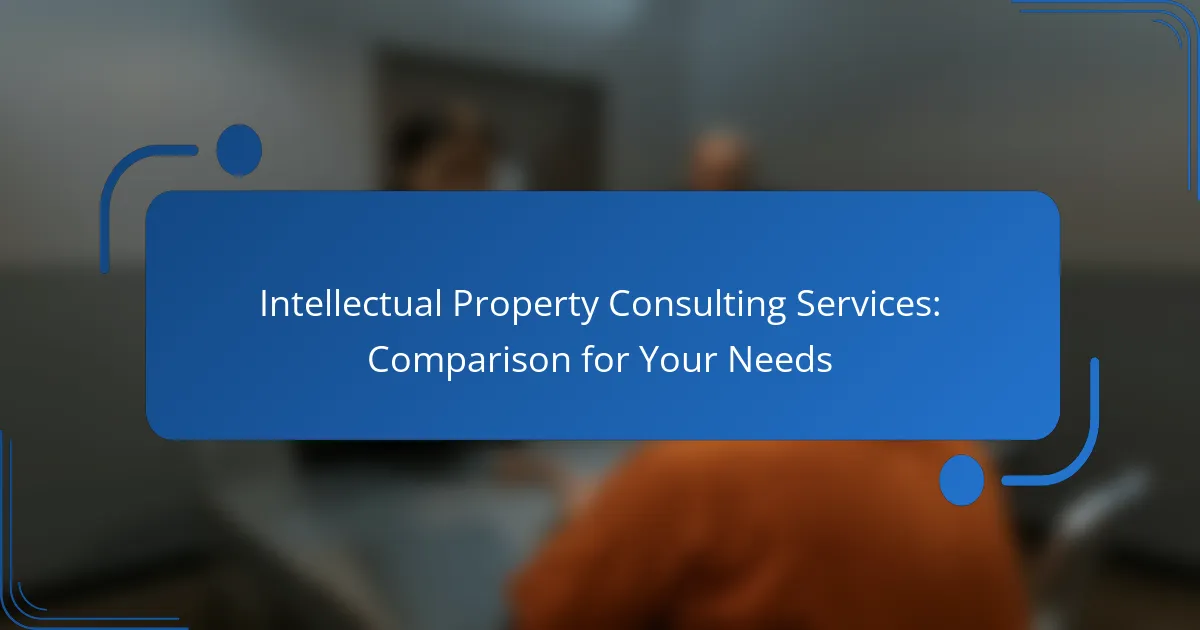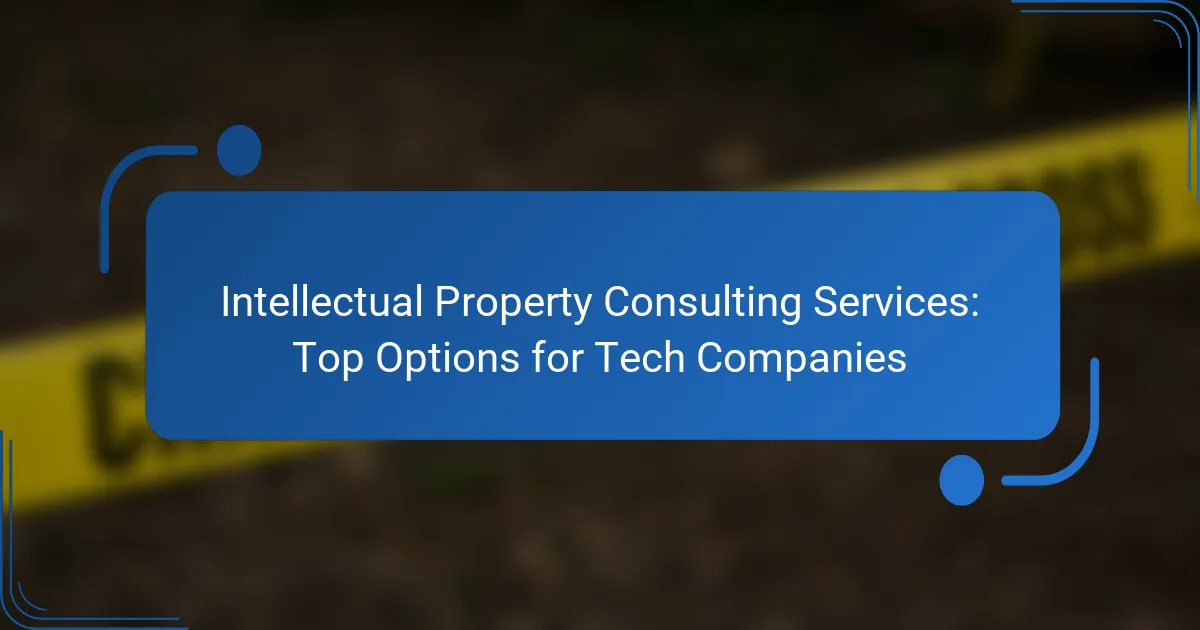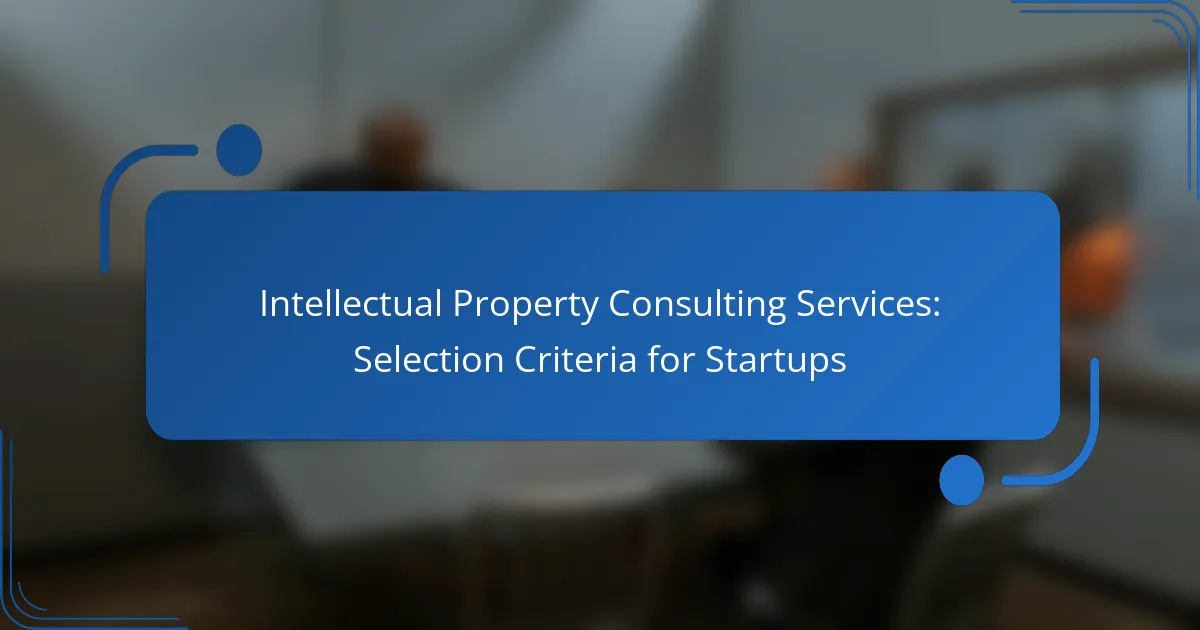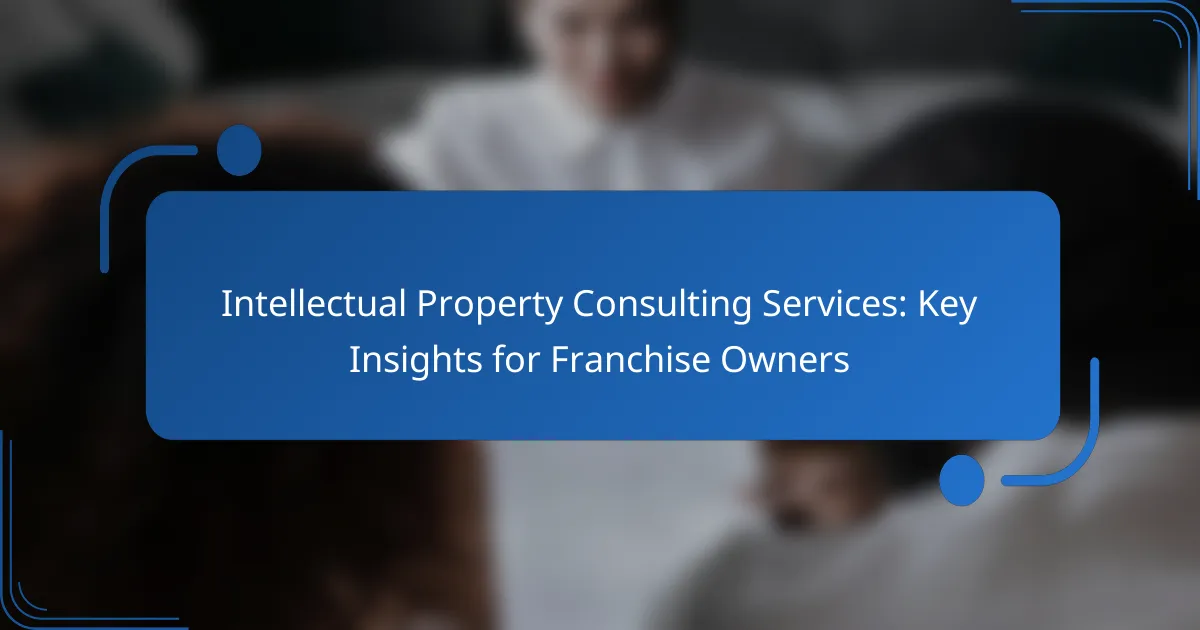Intellectual property consulting services provide essential support for businesses seeking to protect and manage their intellectual assets. From trademark registration to patent application assistance and copyright protection strategies, these services are tailored to meet diverse needs. When selecting a consulting service, it’s crucial to evaluate their expertise, client feedback, and pricing models to find the best fit for your specific requirements and budget.
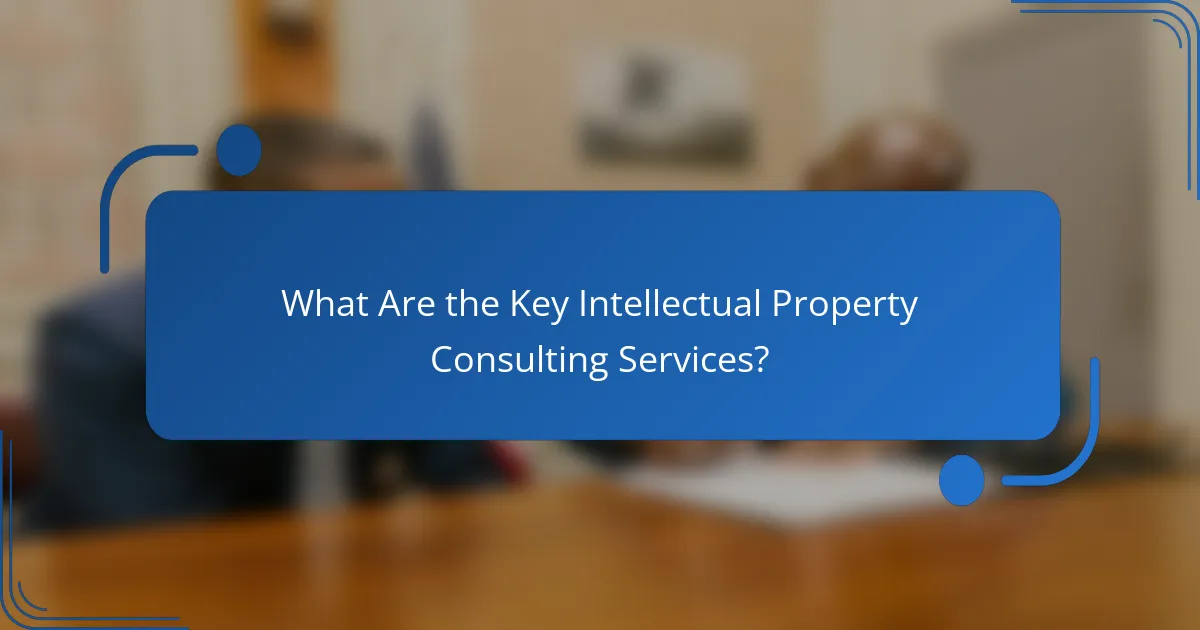
What Are the Key Intellectual Property Consulting Services?
Intellectual property consulting services encompass a range of professional support aimed at helping businesses protect and manage their intellectual assets. These services include trademark registration, patent application assistance, copyright protection strategies, trade secret management, and IP litigation support, each tailored to meet specific needs.
Trademark registration services
Trademark registration services help businesses secure legal protection for their brand names, logos, and slogans. This process typically involves conducting a trademark search to ensure that the desired mark is not already in use, followed by the preparation and submission of an application to the relevant trademark office.
Consider the costs associated with trademark registration, which can vary widely based on the jurisdiction and complexity of the application. In the U.S., for example, fees can range from a few hundred to over a thousand dollars, depending on the number of classes of goods or services covered.
Patent application assistance
Patent application assistance involves guiding inventors through the process of securing patents for their inventions. This includes conducting prior art searches, drafting patent claims, and filing applications with patent offices, such as the United States Patent and Trademark Office (USPTO).
It’s crucial to understand the different types of patents available, including utility, design, and plant patents. The costs for patent applications can be substantial, often reaching several thousand dollars, so budgeting for both application and maintenance fees is essential.
Copyright protection strategies
Copyright protection strategies focus on safeguarding original works of authorship, such as literature, music, and software. Consulting services in this area typically include advising on registration processes, licensing agreements, and enforcement actions against infringement.
In the U.S., copyright registration is relatively affordable, with fees generally under $100. However, businesses should also consider the importance of maintaining records of creation and publication to strengthen their claims in case of disputes.
Trade secret management
Trade secret management involves protecting confidential business information that provides a competitive edge, such as formulas, practices, or processes. Consulting services can help establish policies and procedures to safeguard these secrets, including non-disclosure agreements (NDAs) and employee training.
To effectively manage trade secrets, companies should implement strict access controls and regularly review their confidentiality measures. This proactive approach can prevent costly leaks and maintain a competitive advantage.
IP litigation support
IP litigation support provides assistance in legal disputes related to intellectual property rights. This can include preparing legal documents, conducting research, and offering expert testimony in court cases involving trademarks, patents, copyrights, or trade secrets.
Engaging experienced legal counsel early in the process can significantly impact the outcome of IP litigation. Businesses should be prepared for potential costs, which can escalate quickly, often reaching tens of thousands of dollars, depending on the complexity of the case.
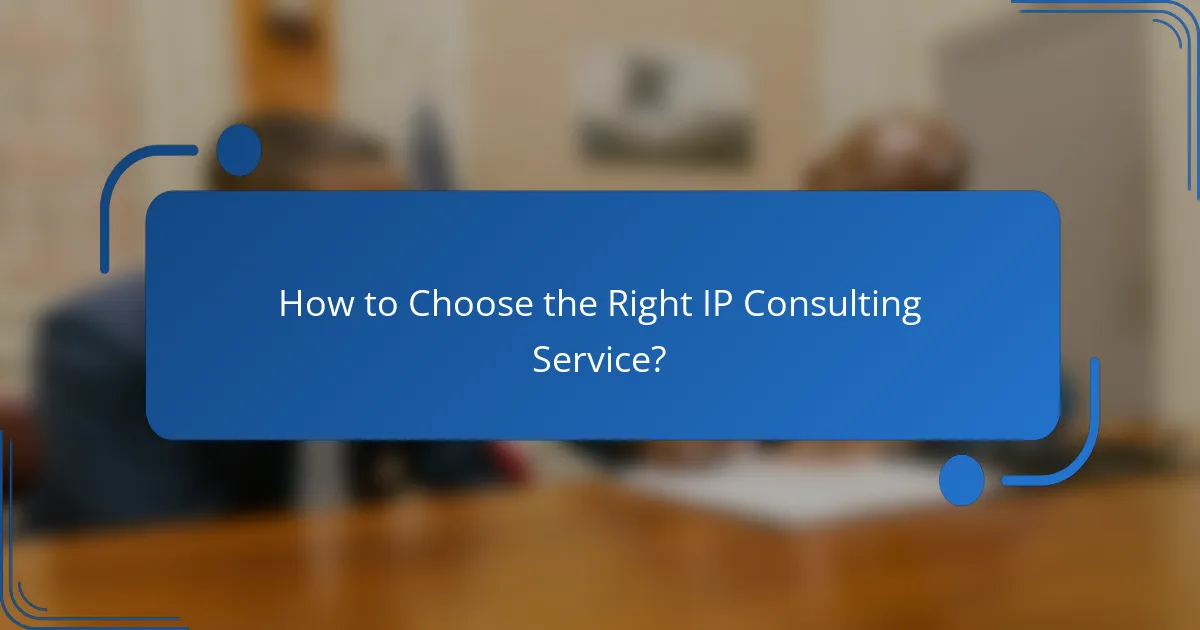
How to Choose the Right IP Consulting Service?
Choosing the right intellectual property (IP) consulting service involves assessing their expertise, client feedback, and pricing models. Focus on finding a service that aligns with your specific needs and budget to ensure effective support for your IP strategy.
Assess service specialization
When evaluating IP consulting services, consider their areas of specialization. Some firms may focus on patents, while others excel in trademarks or copyrights. Identifying a consultant with relevant expertise in your specific IP needs can significantly enhance the effectiveness of their support.
For example, if you are seeking patent protection for a tech innovation, look for a firm with a strong track record in technology patents. This targeted approach ensures that the consultant is familiar with the nuances and challenges of your industry.
Evaluate client testimonials
Client testimonials provide valuable insights into the effectiveness and reliability of an IP consulting service. Look for reviews that highlight successful outcomes, responsiveness, and overall client satisfaction. This feedback can help you gauge how well the firm meets its clients’ needs.
Consider checking independent review platforms or industry forums for unbiased opinions. A firm with consistently positive feedback is likely to be a safer choice, while negative reviews may indicate potential pitfalls.
Compare pricing structures
Understanding the pricing structures of different IP consulting services is crucial for making an informed decision. Some firms charge hourly rates, while others may offer flat fees or retainer agreements. Assess which model aligns best with your budget and expected level of engagement.
For instance, hourly rates can range from low hundreds to high hundreds of USD, depending on the firm’s reputation and expertise. Flat fees for specific services, like trademark registration, can provide more predictable costs. Always request a detailed breakdown of services included in the pricing to avoid unexpected charges.

What Are the Costs of Intellectual Property Consulting Services?
The costs of intellectual property consulting services can vary widely based on the type of service, the complexity of the case, and the consultant’s expertise. Generally, clients can expect to pay either hourly rates, flat fees for specific tasks, or retainer agreements for ongoing support.
Hourly rates for consultations
Hourly rates for intellectual property consultations typically range from $100 to $500 per hour, depending on the consultant’s experience and the service’s complexity. For instance, a junior consultant may charge around $150 per hour, while a senior expert may command rates closer to $400 or more.
When considering hourly consultations, it’s essential to clarify what is included in the rate. Some consultants may charge extra for administrative tasks or follow-up communications, which can increase overall costs.
Flat fees for specific services
Flat fees are often used for specific intellectual property services, such as trademark registration or patent application preparation. These fees can range from a few hundred to several thousand dollars, depending on the service’s complexity and the jurisdiction involved.
For example, trademark registration might cost between $300 and $1,500, while patent applications can range from $5,000 to $15,000 or more. It’s advisable to request a detailed breakdown of what the flat fee covers to avoid unexpected expenses.
Retainer agreements
Retainer agreements provide clients with ongoing access to consulting services for a fixed monthly fee. This model is beneficial for businesses that require regular intellectual property support, as it can lead to cost savings over time.
Monthly retainers can vary significantly, often ranging from $500 to $5,000, depending on the level of service and the consultant’s expertise. Clients should assess their needs and negotiate terms that align with their budget and expected service frequency.
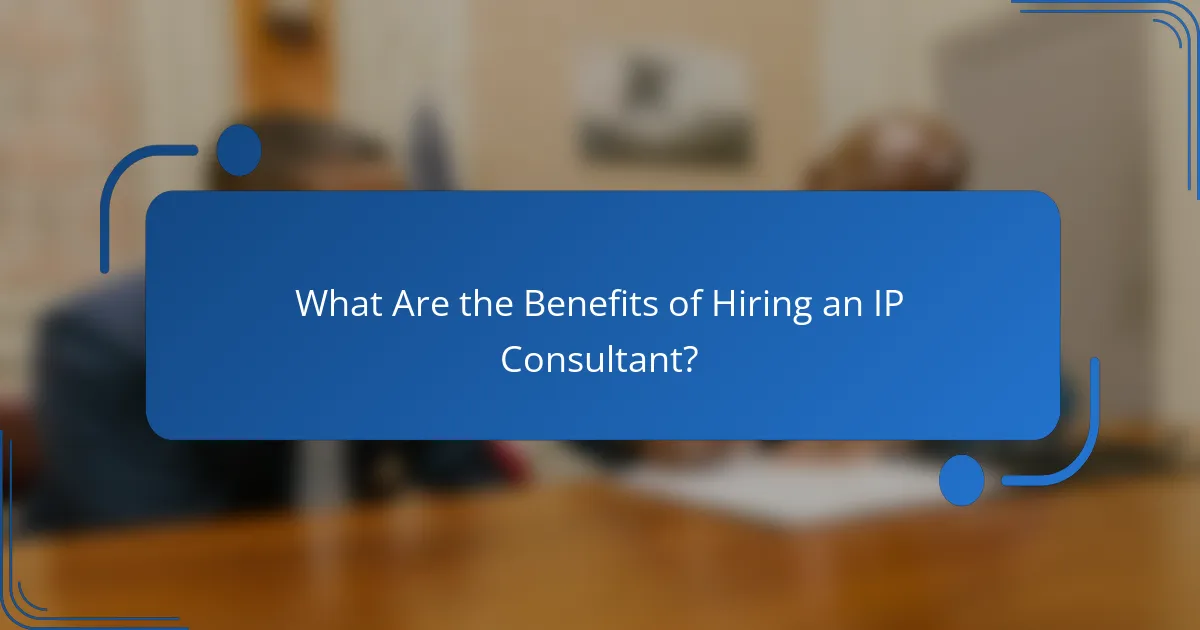
What Are the Benefits of Hiring an IP Consultant?
Hiring an IP consultant offers numerous advantages, including expert guidance on intellectual property laws and tailored strategies to protect your assets. This can lead to significant time savings and improved outcomes for businesses navigating complex IP issues.
Expertise in complex IP laws
IP consultants possess specialized knowledge of intricate intellectual property laws, which can vary significantly by jurisdiction. They stay updated on changes in regulations, ensuring compliance and effective protection of your intellectual assets.
For example, a consultant can help you understand the nuances of patent law, trademark registration, and copyright protections, which can be overwhelming for those without legal training. Their expertise can prevent costly mistakes that may arise from misunderstandings or misapplications of the law.
Time-saving for businesses
Engaging an IP consultant allows businesses to focus on their core operations while the consultant manages the complexities of IP strategy and compliance. This can save valuable time, enabling teams to concentrate on innovation and growth.
By outsourcing IP tasks, companies can avoid the lengthy processes associated with filing patents or trademarks, which can take months or even years. An experienced consultant streamlines these processes, often achieving faster results through established networks and knowledge of best practices.
Customized IP strategies
IP consultants develop tailored strategies that align with your specific business goals and industry needs. This personalized approach ensures that your intellectual property is protected in a way that supports your overall business strategy.
For instance, a consultant might recommend a combination of patents, trademarks, and trade secrets based on your product offerings and market position. This customized plan can enhance your competitive edge and maximize the value of your intellectual property portfolio.

What Are the Risks of Not Using IP Consulting Services?
Not using intellectual property (IP) consulting services can expose businesses to significant risks, including legal disputes, financial losses, and missed opportunities for innovation. Without expert guidance, companies may inadvertently infringe on existing patents or fail to protect their own IP assets effectively.
Legal Risks
Legal risks arise when businesses operate without a clear understanding of IP laws and regulations. Companies may face lawsuits for patent infringement, which can lead to costly settlements or damages. Engaging with IP consultants helps identify potential legal pitfalls and ensures compliance with relevant laws.
Financial Consequences
Failing to utilize IP consulting services can result in substantial financial losses. Companies may miss out on licensing opportunities or fail to monetize their innovations effectively. Additionally, the costs associated with litigation can quickly escalate, draining resources that could be better spent on growth and development.
Loss of Competitive Advantage
Without proper IP protection, businesses risk losing their competitive edge. Competitors may replicate products or services, leading to market saturation and reduced profits. IP consultants can help devise strategies to safeguard unique offerings and maintain market position.
Missed Opportunities for Innovation
Not leveraging IP consulting can hinder a company’s ability to innovate. Without a clear understanding of existing patents, businesses may avoid pursuing new ideas due to fear of infringement. IP consultants can provide insights into the patent landscape, encouraging companies to explore new avenues for development.
